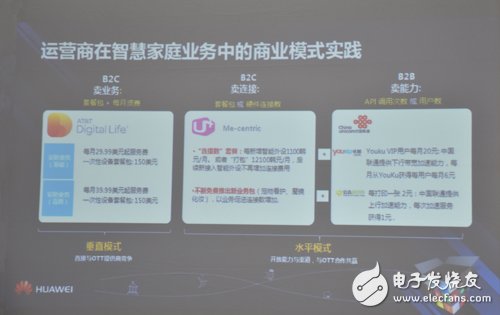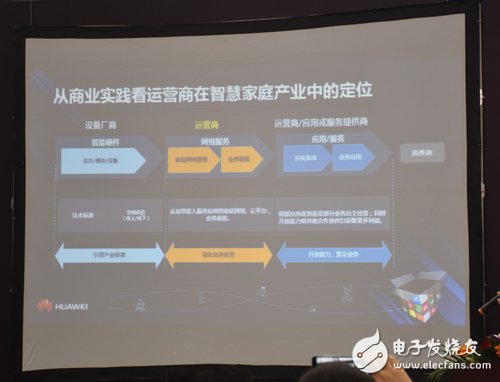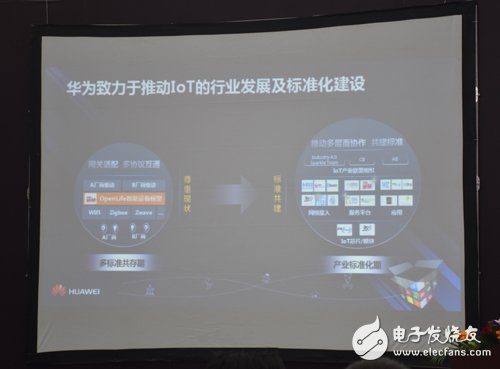On May 19th, 2016, China Smart Home Expo was held in Shenzhen Convention and Exhibition Center. The author was fortunate to listen to Huawei's fixed-line spokesperson's judgment on the trend of smart home market and what kind of business model Huawei is prepared to use in this market to explore business opportunities. Yuan Zhiwei, Marketing Cooperation Manager of OpenLife Business Unit of Huawei's fixed network product line, said that smart homes bring new business opportunities to operators. It is another key business after voice, mobile broadband and video. The final purpose of operators' operations is different. Is to increase the AUPR value of a single user. According to a research report by consulting firm Gartner, more and more home applications have entered the high-speed development stage across the rift. Faced with huge market space, 60% of the global TOP100 telecom operators plan to enter the smart home market. In the next two years, the operator's smart home market will enter a stage of rapid development. Yuan Zhiwei has demonstrated the development plan of global smart home users: China's three major operators plan to develop 10 million users in three years, five operators in Southeast Asia plan to develop 3 million users, and eight operators in South Pacific countries have started. The commercial plan will develop 5 million users in 3 years, Europe and Germany plan to develop 2 million smart home users in 3 years, and the Middle East plans to develop 5 million smart home users in 3 years. What are the unique advantages of operators involved in smart business? First, with an end-to-end user experience, it is his strength in terminal devices and cloud services. Many vendors are either in the terminal device or have advantages in the cloud, but without intermediate network support, the business model is very difficult to succeed. In terms of the most powerful component of the smart home, 2K or 4K video has high bandwidth requirements for real-time monitoring. VR products, robots, virtual reality is now necessary to choose 100 megabits of wireless network, operators have network facilities, second, consumer broadband is high, operators are launching smart home services based on home broadband services. Consumer acceptance will be higher. Third, high-coverage offline resources, including a large user scale, Chinese operators have 800 million broadband users, operators have business halls in all major urban areas, users can better experience wisdom in this environment Home business, online and offline resources integration. There are also operators with resource integration capabilities, consumers with a security need, looking for Huawei routers, and looking for cloud storage device service providers. Operators have the ability to integrate resources and integrate various resources in the form of services. Provided to consumers, consumers can choose freely. Smart home business, three modes of operator operation Yuan Zhiwei PPT demonstrated three different smart home models of the world's three major operators: AT&T is selling business, South Korean operators are selling connections, and Chinese operators are selling. For example, he said that AT&T launched the smart home service. The security business is divided into basic services and advanced services. The basic service charges $29.99 per month for service fees, the one-time device package service package costs $150, and the advanced service charges $29.99 per month. From the service charge, the one-time equipment package service package is $150. Korean operators have launched smart home services, one access fee of 1200 won per month, and the maximum number of access caps is 12,000 won. Korean operators cooperate with Samsung and LG to make multiple smarties such as makeup and home that consumers like. Provide services on the business to attract users to use more connections and traffic. China Unicom and China Telecom will implement different service packages for different members. The home bandwidth is 20 megabytes, giving certain business benefits, increasing bandwidth to 100 megabytes, and encouraging them to use higher definition video services and TV services. In the smart home business, equipment vendors, operators, applications and service providers have their own unique positioning and functions in the industry chain, as shown in the following figure. In the cloud business, Huawei provides two service methods. One is to provide hardware infrastructure, that is, to sell hardware products, to help operators build various clouds. The second provides various resources such as computing resources and storage resources, and the operator can carry out its own service business. Under the integration of OpenLife, traditional equipment suppliers entering the Internet of Things do not need to change hardware, only need to develop adaptive drivers, they can be integrated within two weeks. Among them, Huawei has to integrate even APP. Imagine if all the furniture equipment in the future is connected to the Internet of Things, and each application corresponds to an app, which is more troublesome than finding the remote control as a whole. To this end, Huawei has proposed a platform for integrating various types of mobile phone apps. Developers and even an H5 can let users control smart homes. CPVC Sheet Conical Twin Screw Extrusion Line High Capacity Cpvc Sheet Conical Twin Screw Extrusion Line,Precision Cpvc Sheet Conical Twin Screw Extrusion Line,Affordable Cpvc Sheet Conical Twin Screw Extrusion Line,Customizable Cpvc Sheet Conical Twin Screw Extrusion Line Zhejiang IET Intelligent Equipment Manufacturing Co.,Ltd , https://www.ietmachinery.com
Figure 1: Yuan Zhiwei, Marketing Cooperation Manager, OpenLife Business Unit, Huawei Fixed Network Product Line 
Figure 2: Smart Home Development Program for Major Carriers Worldwide 
Figure 3: Three different smart home operating modes for operators 
